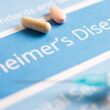Non-Drug Interventions for Alzheimer’s
Examining Non-Pharmacological Interventions for Alzheimer’s Disease: A Look Beyond Medication
Alzheimer’s disease (AD) is a degenerative neurocondition that progresses over time and poses a substantial challenge. A comprehensive approach is essential for controlling symptoms, even if medication plays a part. This blog post explores non-pharmacological treatments for AD and highlights methods that can enhance wellbeing, strengthen cognitive function, and enhance quality of life.
Non-Drug Interventions for Alzheimer’s
Table of Contents

Revealing the Potential of Non-Drug Methods:
Non-Drug Interventions for Alzheimer’s
Non-pharmacological treatments have a number of benefits.
- Safety: They typically have few adverse effects and are safe and well-tolerated.
- Customisation: They can be made to fit each person’s requirements and tastes.
- Complementary Care: They maximise advantages by combining well with medication.
Here are a few important non-drug therapies to consider:
Non-Drug Interventions for Alzheimer’s
- Mental Excitation:
Maintaining cognitive function and enhancing everyday life abilities can be achieved via mental workouts and activities that test language, memory, attention, and problem-solving abilities. These could consist of:
- Games and puzzles: Jigsaw puzzles, Sudoku, and crosswords are a few examples.
- Exercises: for memory include mnemonic devices and recall exercises.
- Acquiring new abilities: picking up an instrument or picking up a language.
- Rehabilitating Cognitive Function:
The goal of this individualised strategy is to retrain particular cognitive skills that have been impacted by AD. It entails a therapist collaborating with the patient to address issues and create coping mechanisms for situations like memory loss or trouble with everyday duties.
- Interaction with Others:
Keeping up social ties is essential for general wellbeing. Engaging in social activities such as support groups, group conversations, or quality time with loved ones helps alleviate social isolation, elevate mood, and enhance cognitive performance.
- Exercise:
There are several advantages to regular exercise for AD sufferers. It is capable of
- Boost your coordination, balance, and physical fitness.
- Boost memory and cognitive performance.
- Improve mood and lessen worry.
- Encourage deeper slumber.
- The use of music therapy
In music therapy, a professional therapist and patient engage in musical creation or listening. It is an effective tool for:
- evoke feelings and recollections.
- Boost happiness and lessen agitation.
- Encourage social engagement and conversation.
- Art Therapy:
For those with AD, creating visual arts such as paintings, drawings, or sculptures can be a therapeutic release. It is capable of
- Encourage calmness and a decrease in stress.
- Encourage self-expression and inventiveness.
- Enhance your hand-eye coordination and motor abilities.
- Nutritional Assistance:
In addition to supporting general health, a diet high in fruits, vegetables, and whole grains may also decrease the ageing process of the brain. Other crucial components of nutritional support include controlling weight and drinking enough of water.
- Techniques for Mindfulness and Relaxation:
Methods such as yoga, meditation, and deep breathing exercises can help lower stress levels, increase quality of sleep, and encourage relaxation—all of which are advantageous for those with AD.
Improving Treatment: Including Non-Medical Interventions
Non-Drug Interventions for Alzheimer’s
The most effective method for managing AD is a customised strategy that includes:
- pharmacological therapies
- Non-pharmacological interventions
- Supportive care includes helping with everyday tasks.
For each person’s needs and preferences, the best combination of therapies must be determined in collaboration with a healthcare provider with expertise in dementia care.
The Path Ahead: An Integrated Method for Alzheimer’s Care
Non-Drug Interventions for Alzheimer’s
People with AD and those who care for them can greatly enhance their quality of life using non-pharmacological therapies. These methods, when combined with medicine and additional support networks, can help us develop a more comprehensive and successful care plan for this complicated illness. We may anticipate more developments in pharmacological and non-pharmacological therapies as research progresses, providing a better future for people with AD.


